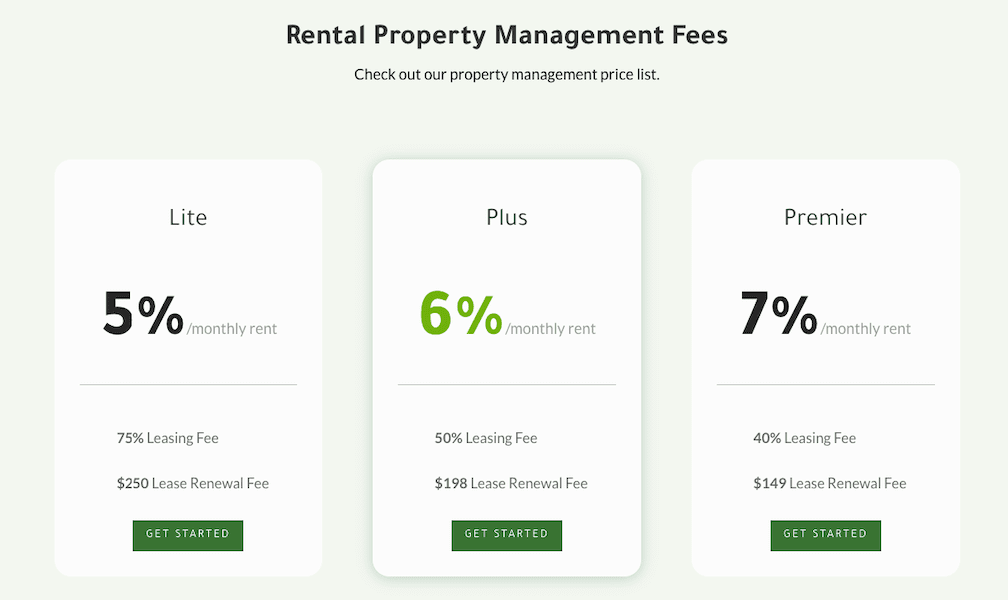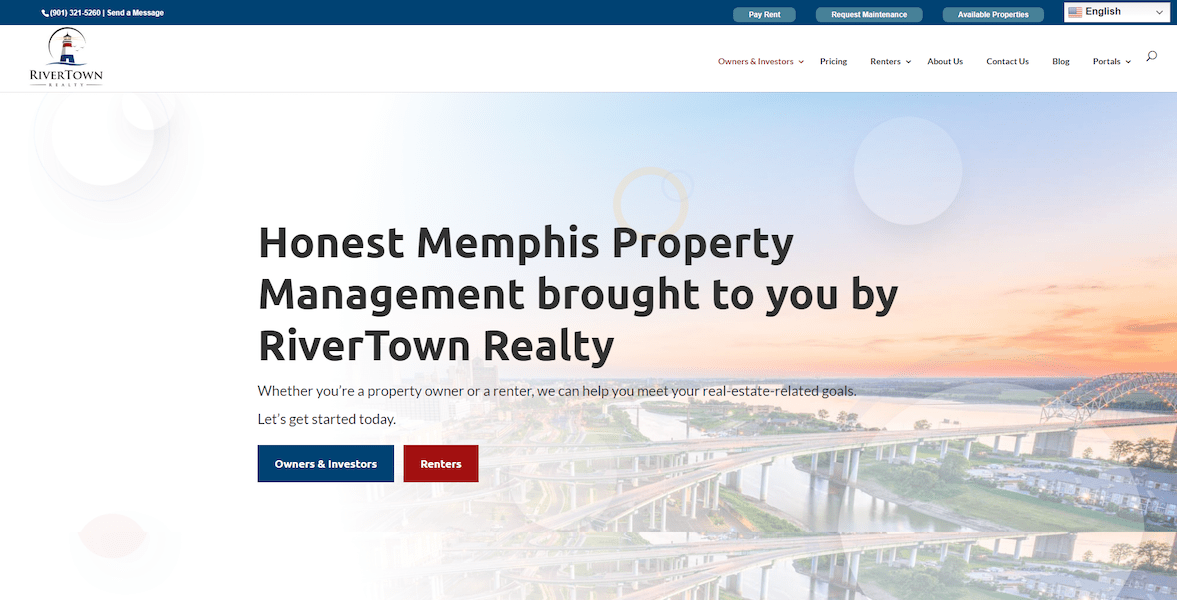Have you been looking for more marketing ideas for your property management company? Is your current strategy not getting you the kinds of owner leads you’d like? Do you need more owner leads, but don’t know how to get them?
Let’s start with this: Property management marketing shouldn’t just get you owner leads. It should get you the right kind of owner leads. That means, owner leads that will thrive working with your property management company. Why waste your time and money chasing leads that aren’t a good match for your company’s structure and speciality?
Instead, create a marketing strategy that collects better and longer-lasting leads, and filter out the rest. With the right strategies in place, you can create a successful marketing plan for your property management company that will bring in quality leads who are a great match for your business.
At its core, property management marketing should attract the best possible owners who will thrive working with your business – because when they do well, so do you!
But where to get started? There are many different marketing strategies that you can utilize to help grow your business.
What is Digital Marketing?
Digital marketing is the practice of promoting and advertising products or services through digital channels, such as websites, search engines, social media, email, mobile apps, and other digital technologies.
Online marketing strategies may include search engine optimization (SEO), pay-per-click (PPC) advertising, social media marketing, email marketing, content marketing, and other tactics. Potential clients may find your business using phones, computers, tablets or other devices, through searches or targeted ads.
Benefits of Digital Marketing for Your Property Management Business
Online marketing is a powerful tool for property management businesses, offering the potential to reach a wider audience and generate more leads. It also enables businesses to connect with potential clients on multiple platforms and measure their campaigns in real time.
Benefits of digital marketing include improved customer engagement and loyalty, increased website traffic and conversions, better visibility in SERPs (search engine results pages), and brand recognition through targeted ads. By optimizing content for SEO purposes as well as creating engaging content, businesses can use digital marketing strategies to boost their online presence while connecting with potential customers.
Getting Started with Digital Marketing

1. Identify Your Property Management Company’s Ideal Owner
The first step is to figure out the right kind of owner. At Fourandhalf, we like to call this the ideal client. We talk to a lot of property managers who tell us their ideal client is anyone with a rental property within their service area. Now, that may sound like a reasonable response. But if you think about it, do you really want to:
- Manage a property that is falling apart?
- Take on a property that’s in a bad neighborhood?
- Work with an owner who was nickel and diming you?
Some property managers might, but do you? A lot of property managers can easily rattle off the qualities of their ideal tenant, but only a few can identify their ideal owner client. By knowing who you want to target, you can then create marketing strategies that will attract the exact type of person you want to work with.
Defining your ideal owner client can be challenging, and one useful tip is to look at your existing portfolio:
- Which property owners give you the most profit without driving you and your staff crazy?
- Are they investors looking to grow their portfolio with you? Are they accidental landlords?
- Do they own one or multiple properties?
- What types of rental properties do they own?
- Where are they located?
At Fourandhalf, we believe that understanding a company’s ideal client creates a strong foundation for property management marketing and helps you create more efficient marketing strategies.
2. Understand your Ideal Client’s Pain Points
Now that you know who you want to target, the next step is to create content that is related to the owner’s pain points. But what’s a pain point? A pain point is a problem that any property owner may experience with their rental property. Common pain points include rent collection, maintenance, and evictions.
3. Create a Property Management Marketing Plan and Write it Down
It’s easy to just say that you’re going to start posting to social media regularly, but it’s often hard to actually get started and keep to it. In order to stay focused and on track, come up with a property management marketing plan. It keeps your messaging consistent, ensures that you’re reaching your ideal client, and helps you build relationships.
A good plan also allows you to track what works, so that you can make adjustments as needed and make sure your efforts are producing results.
Property management companies can get the most out of their marketing plan by including strategies that focus on long-term relationships with prospective customers. These include taking charge of your online reputation, using email marketing to warm up leads, and offering referral programs for existing owner clients, realtors, and vendors.
Additionally, property managers should ensure that their website includes all necessary information in an easy-to-find location so potential owners have access to important details about your services. By creating a comprehensive plan that encompasses these marketing strategies and more, you can gain loyal customers who are a great fit for your business.
It doesn’t matter how fast you are growing; if you are going in the wrong direction or you don’t know which direction you’re running in, you’ll never get to your destination.
Digital marketing for your business doesn’t have to be overwhelming. To help you get started on this journey of success, here are some powerful ideas for effective marketing strategies for property management companies which can help turn around any lackluster lead generation and marketing efforts:
Property Management Marketing Ideas:
1. Leverage Content Marketing

Content marketing is an effective way to connect with customers, not just through selling products but by offering valuable content that can solve their problems. It’s all about building relationships and trust over the long term so people get to know your business as a reliable source of information they can rely on. As such, it’s proven tremendously beneficial in increasing brand awareness and loyalty – leading more potential buyers towards you.
A good content marketing strategy leverages different types of content such as educational blogs, videos, podcasts, posts to social media pages and eBooks. Provide content that deals with the pain points that you know your ideal owner is having with their rental property. The more you’re helping owners understand their problems, the more trustworthy and show-worthy you look to search engines.
But won’t they just do it on their own if I give away all my secrets?
If you’re scared about giving too much information, just think about this — with the power of the internet, property owners and investors can easily find answers with a click of a button. Wouldn’t it be nice if they found those answers on your website and see you as a trustworthy property manager with nothing to hide? Once they reach a point where they can’t handle it themselves anymore, who do you think they will call for help?
The goal of content marketing is to keep your business top of mind for your target audience. In many markets, there are many property management companies that leads can choose from and you want to make sure to stand out in a good way. Content marketing is a great choice for a marketing strategy that will help you build relationships in the local community and stay top of mind for potential clients.
2. Create Frequently Asked Questions for Owner Leads
Create a web page that answers frequently asked questions, which you can provide to owner leads and include on your company website. This is different from your blogs because each owner you’re reaching is in their own stage of the buying cycle. Some owners may be going after generic information, so they want a quick answer. Other owners may be more serious about it, and they’ll want a deep dive on a particular topic. FAQ pages are also a great source of information for new clients.
The questions that need answers are actually in your email inbox. You get a lot of emails from existing owners and owner leads with questions that come up again and again. If a question comes up over and over during the sales process, then it’s something that future owner leads will be asking. Answer it on your website.
Common questions often concern the services provided, costs, and regulations. Property owners may ask about the range of services that a property management company offers, such as rental advertising and tenant screening, maintenance coordination and repairs, rent collection, evictions, paperwork filing, and more. This is a simple way to help your target audience know whether or not you’re the property management company for them.

3. Review your Property Management Packages & Pricing
This may not be as obvious, but you need to review your packages and pricing. Whether you are a brand-new property management company or a mature company that has been in the property management industry for decades, it is still a healthy exercise to re-examine pricing time and time again. Make sure that what you offer is tied into the needs and the wants of the types of owners that you want to attract.
Pretend that you’re that property owner. Go through your packages, services list, pricing, etc, and see if they make sense as solutions to the property owner’s needs and problems. Remember that although you know what’s included in a management fee, a typical owner does not. This may be their first time working with a property management business, and you want them to have a solid understanding of what they will be getting. The specific property management services that you offer can make a difference in the number of leads you get from your website.
If your company has clear and competitive packages and/or pricing, it could give you an edge in paid advertising or on social media sites as your hook. Your website also needs to include this information, and make sure it’s easy to find. This is often overlooked in a marketing strategy, but it can really make all the difference.

4. Make your Property Management Website User-Focused
Your property management website is the face of your digital marketing efforts, and so it must be user-friendly and provide relevant content to all visitors. When visiting your website, both owners and tenants want to find information or perform an action. When they cannot find the information or perform the action they want, they will jump to another website.
In order to make a property management website more user friendly, property managers need to focus on creating an intuitive and easy-to-navigate design. This means having clear menus and labels that are simple for users to understand. It’s important to make your service locations easy to find so that you aren’t wasting time on leads you can’t serve.
The site should also feature prominently displayed contact details so that users can easily reach out with any questions or concerns they may have. It’s also a good idea to link out to your social media platforms so leads can see your other content.
Additionally, the website should be mobile responsive so that it looks great on all devices, regardless of size or operating system. This will also help your website rank higher on search engines and help generate leads.
Finally, as we mentioned before, it’s important to keep content up-to-date since stale content will turn away potential customers who are looking for fresh information about your services.
A frictionless website will draw new leads in rather than push them out. This makes it more likely that they’ll stay with you and convert. Digital marketing, including your website, should work for you and not against you.

5. Comprehensive Search Engine Optimization (SEO)
Another key component of property management marketing is your website’s search engine optimization, or SEO. If your website doesn’t have the right keywords, owners will have a hard time finding it when they search online for property management. Showing up on the first page of search engines such as Google or Bing can increase your reach dramatically.
Property management websites are one of the most important aspects of a solid marketing plan. It’s often a property owner’s first impression of your business.
What is SEO?
Search engine optimization (SEO) is the process of optimizing website content and structure to increase visibility and rankings on search engine results pages (SERPs). To effectively optimize your website for better visibility, you’ll need to identify relevant keywords and incorporate them into your content. This includes using keywords in the titles, meta tags, and body of the content, as well as using natural language that contains those keywords.
Improving website loading speed and mobile-friendliness is essential for SEO success. Search engine algorithms take into consideration how quickly a website loads and how user-friendly it is on mobile devices. To increase your website loading speed and mobile-friendliness, make sure to optimize images, minify code, enable browser caching, and use a responsive design.
Search engine optimization isn’t just about one thing. It’s a combination of many things like your website copy, your blogs, and your videos. Other things matter like page titles and descriptions. Everything works together to bring you to the top of search results.
There is also local SEO to consider. Local businesses need to optimize their online presence to attract more leads in their target customer markets. This just means that you prioritize:
- Location-specific keywords in your website’s title tags, meta descriptions, headings, and content.
- Create and optimize a Google My Business listing for each of your locations.
- Encourage customers to leave reviews on your GMB listing and other review platforms.
- Create locally-focused content: Develop content that is relevant and valuable to your local target market, such as blog posts, videos, social media posts, paid advertising, or infographics that highlight local events, attractions, or issues.
It is very important to find a marketing agency that understands the property management industry so that they know what to look for when they are crafting your website copy. This is one aspect of digital marketing that is best to outsource, as SEO is changing constantly.

6. Take Charge of your Property Management Company’s Online Reputation
Digital marketing will attract owner clients if you manage your online reviews properly. Remember this famous quote: “It takes a lifetime to build and only a second to destroy.” That describes your reputation. So, make sure you have a plan on how to deal with negative reviews and take control of your overall reputation.
It doesn’t take much time or effort to use your reviews to your advantage – you just need to have a plan in place. If you’re not sure where to start when asking for positive reviews, you can always start pulling contacts from your property management software and go from there.

What should property management companies do with negative reviews?
Not all negative reviews will destroy local businesses. It’s all about how you frame your experience when you are dealing with owners. Many property managers will ignore their negative review but negative reviews can actually be used to improve your business if it helps you realize that some of your vendors or staff members are creating issues. Therefore, it’s important to come up with a plan for responding to negative reviews.
Flip the script and think about your online reputation in different way. Your online reputation is an important part of your digital marketing strategy, but only if you use it to your advantage.
7. Use Email Marketing to Warm Up Your Owner Leads
Another important aspect of marketing for property management businesses is email marketing. Email marketing can warm up your leads. You probably have leads that aren’t quite ready to close yet, but don’t throw them into the lost leads pile. You don’t have to give up hope so fast.
Choosing a property management company is a very big decision for property owners. Help them make up their minds by providing information they can use to figure out the needs they didn’t know they had.
You can show them what will help their rental property. You’ll address their questions and answer their fears, and you’ll also position yourself as a supportive resource who is on their side. Then, when they’re finally ready to hire a property management business, they’ll think of you first.
8. Owner Referral Programs for Existing Owner Clients, Realtors, and Vendors
Property management marketing doesn’t have to be complicated! Owner referrals is just good old word of mouth marketing — tried and true. There’s a reason so many companies have programs for referrals. Here are the different types that are common in the property management industry:
- Create referral programs for existing owners. Those owners know other owners, and they may have friends and family members who know owners.
- You can also offer realtor referral programs. Having good relationships with local realtors can be powerful. It can be a huge win-win for all parties involved.
- Referral programs that reward your vendors can also be a great way of getting new owner leads.
Referral programs are one of the most affordable marketing tactics for generating leads – but are most successful when they’re mutually beneficial. Consider what incentives are most valuable for each of your referral partners and learn to build and maintain those relationships.
Still need help with your property management marketing strategies?
If you need any help implementing these property management marketing ideas or you’d like to start with a marketing plan, contact us at Fourandhalf. We are passionate about helping property management companies like you win at every stage of marketing and growth. From property management websites to paid ads to social media posting, we can help you with all aspects of creating a solid marketing plan.

